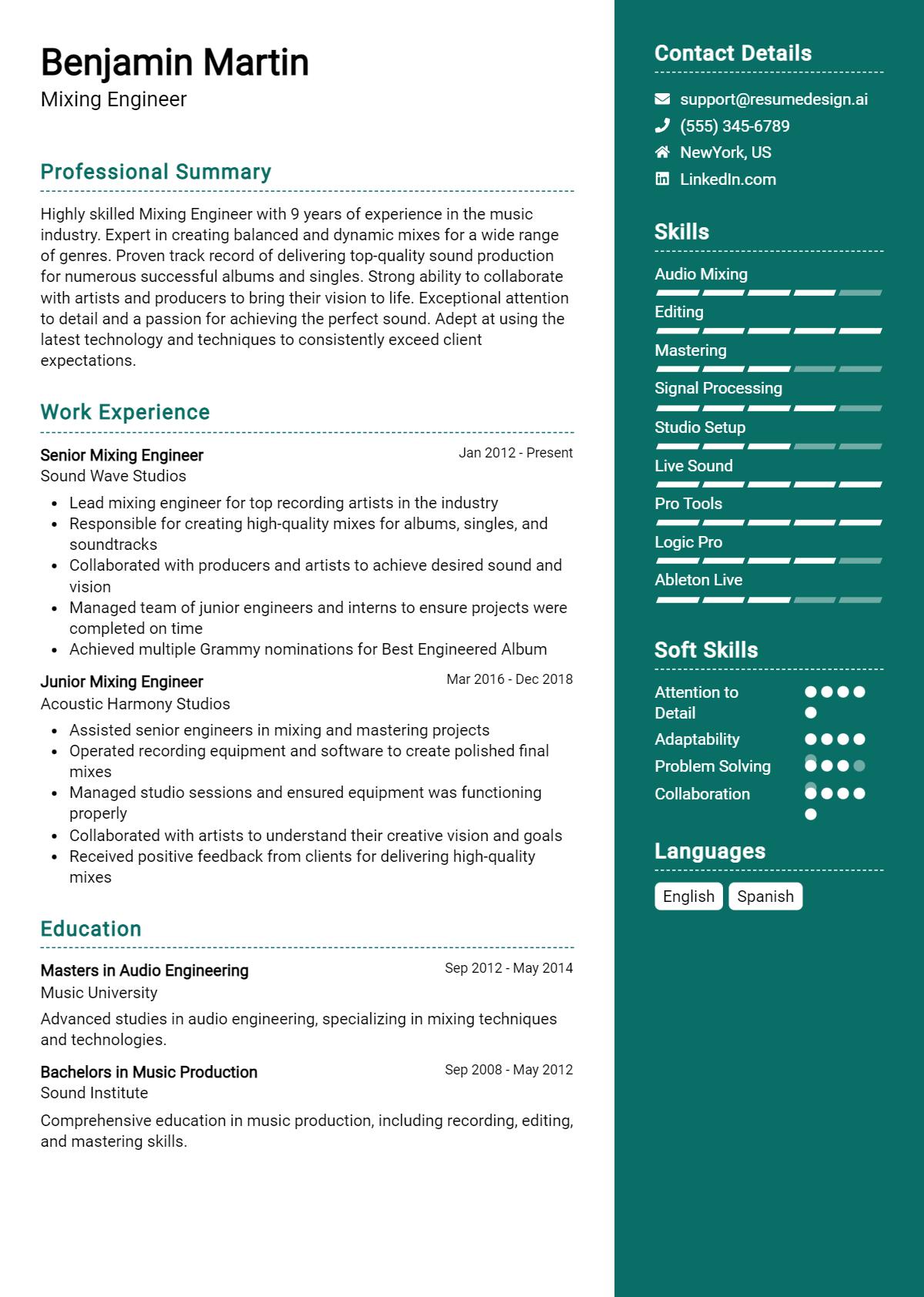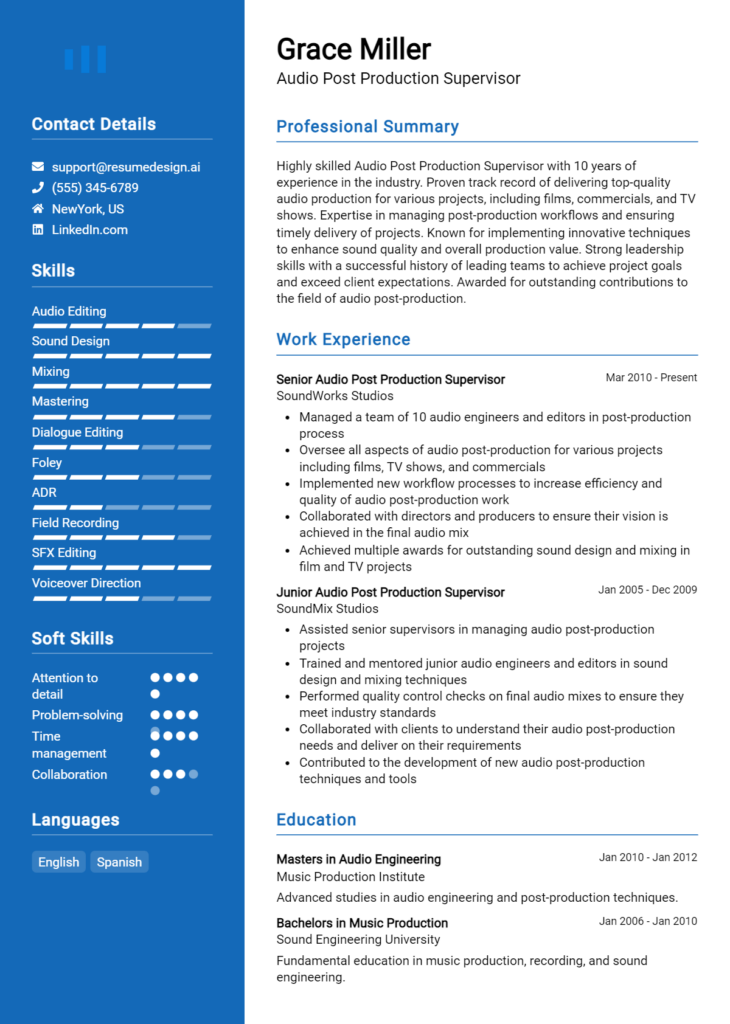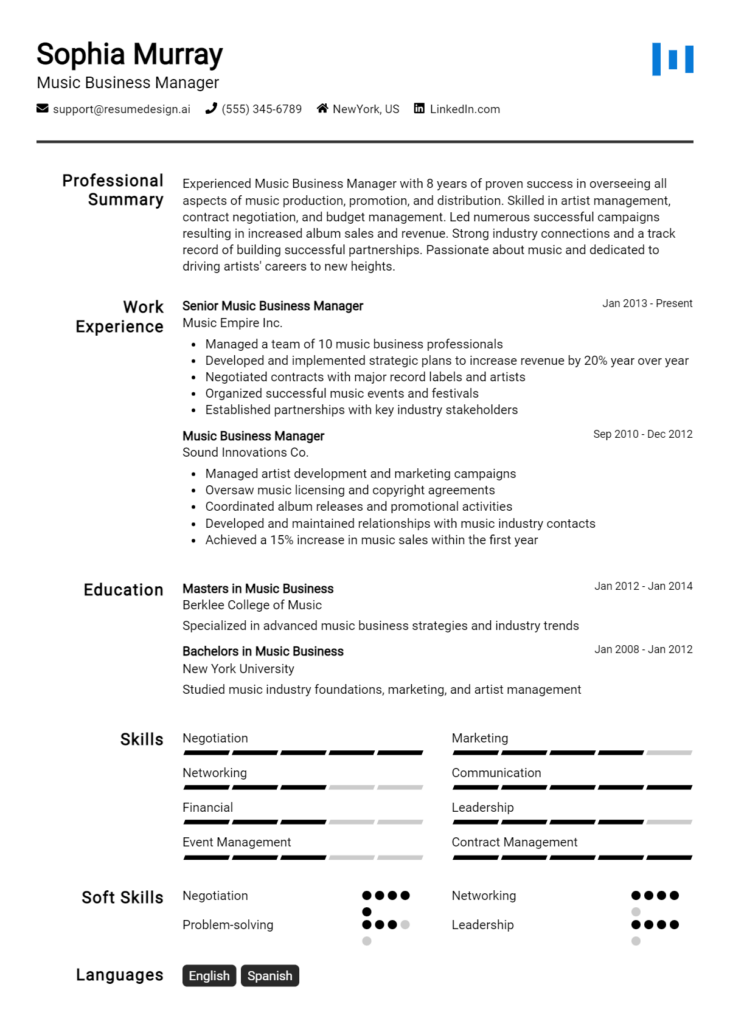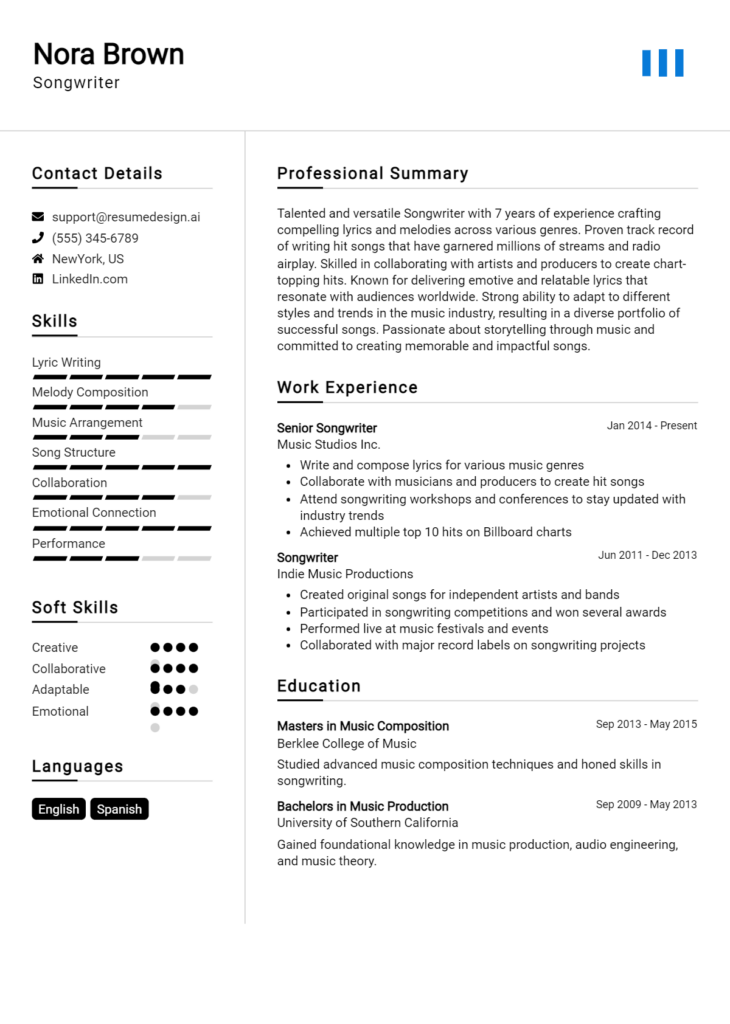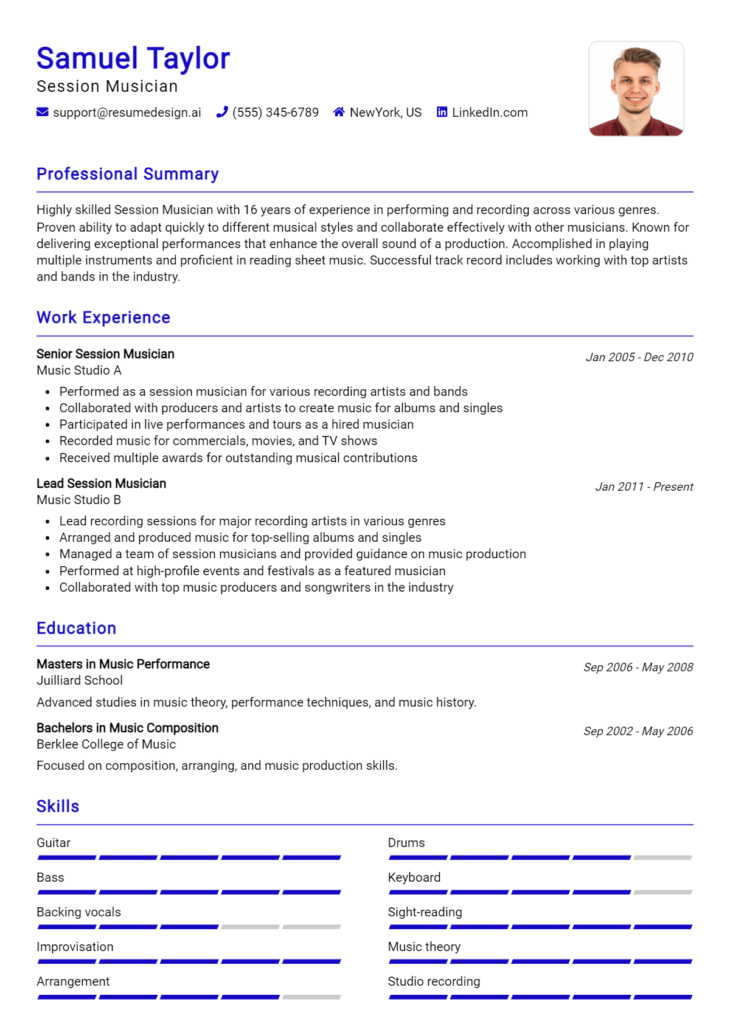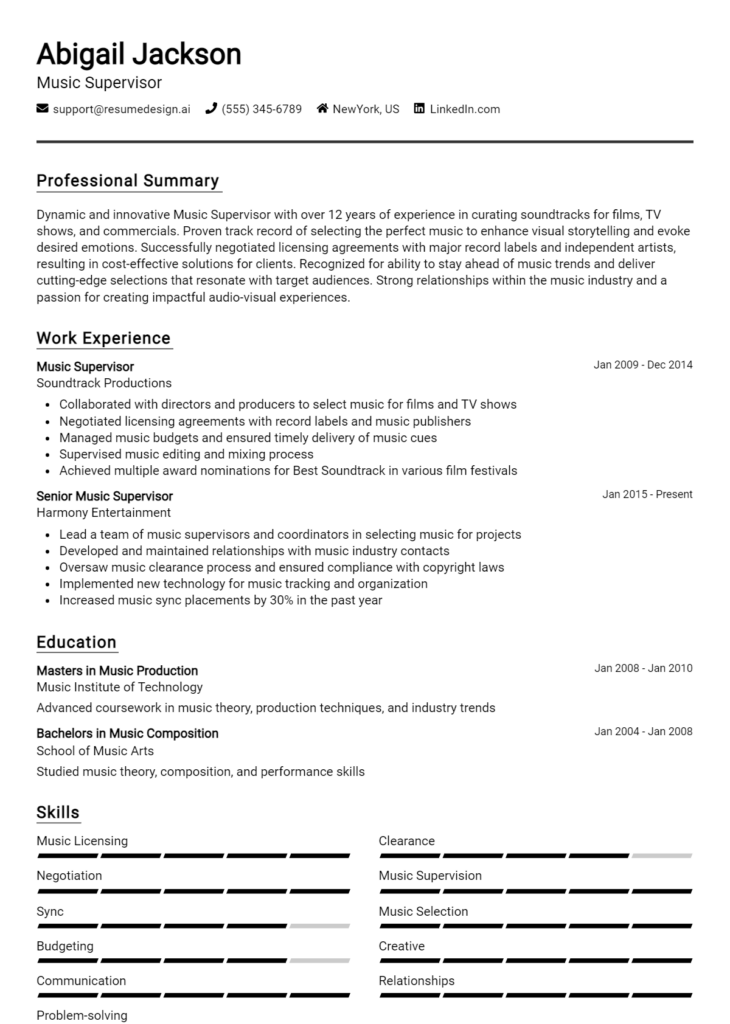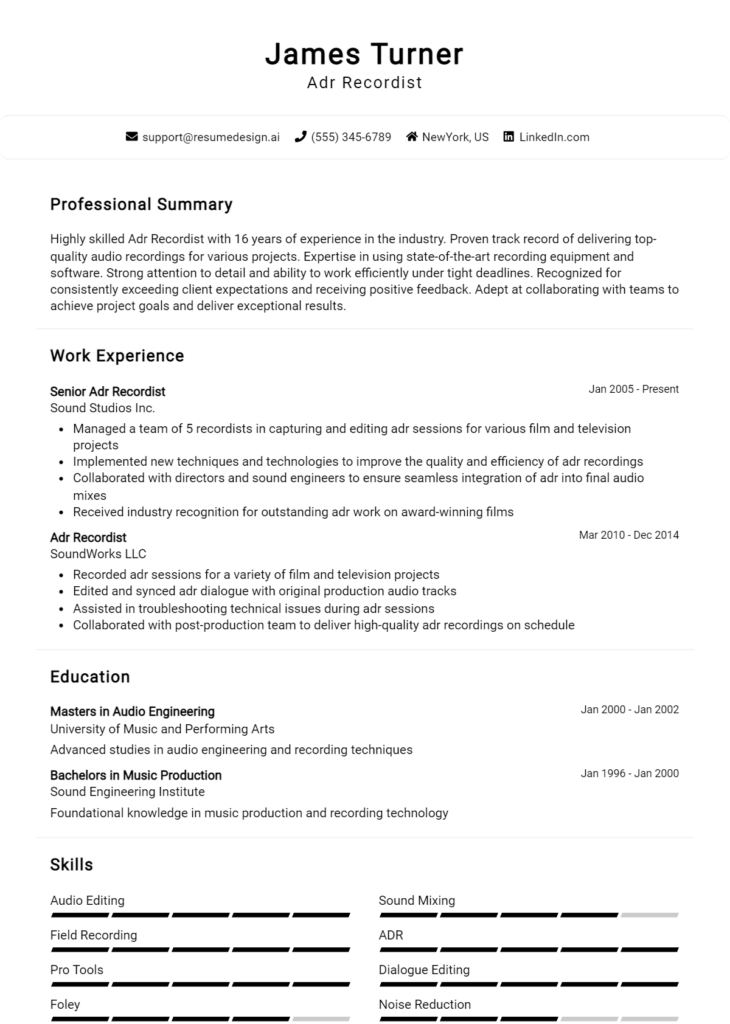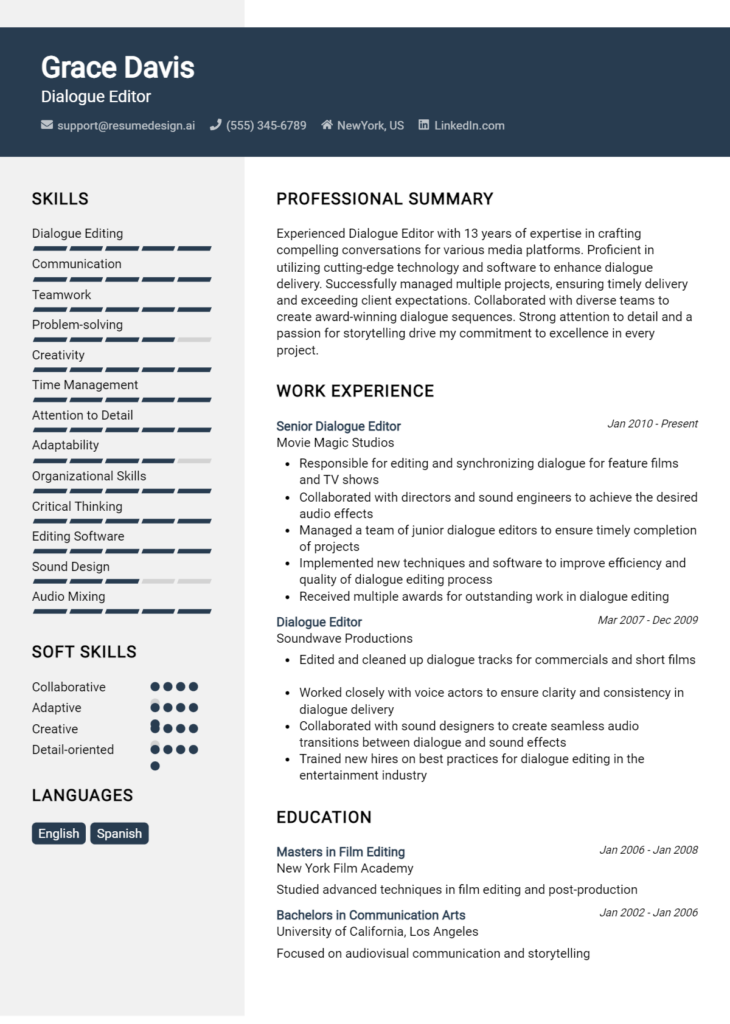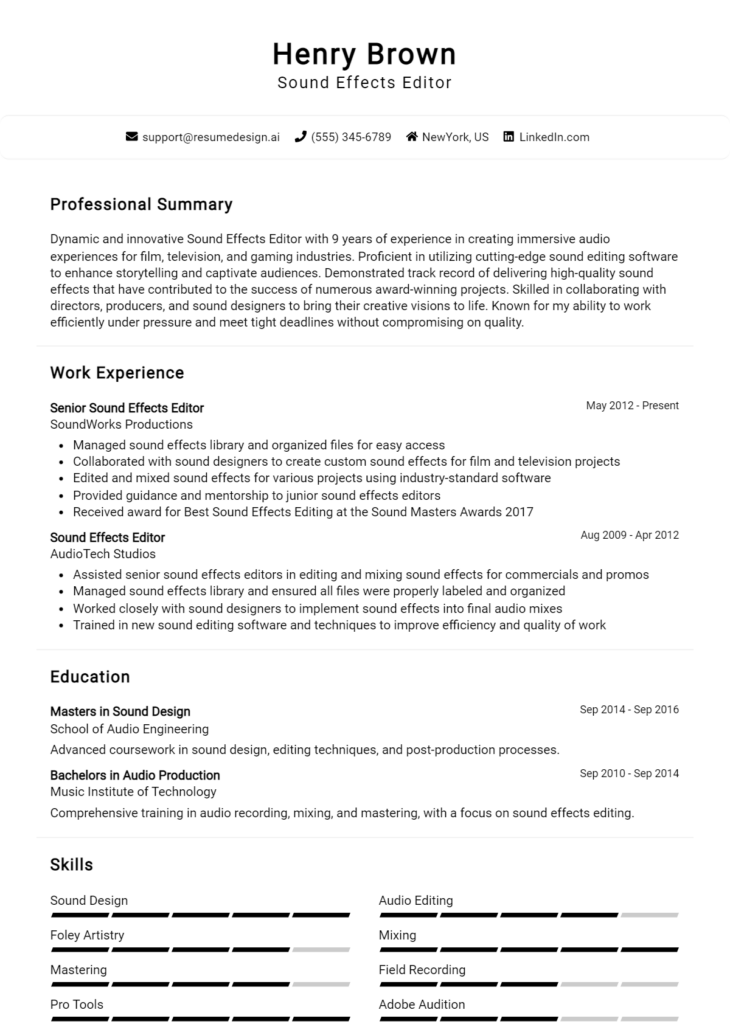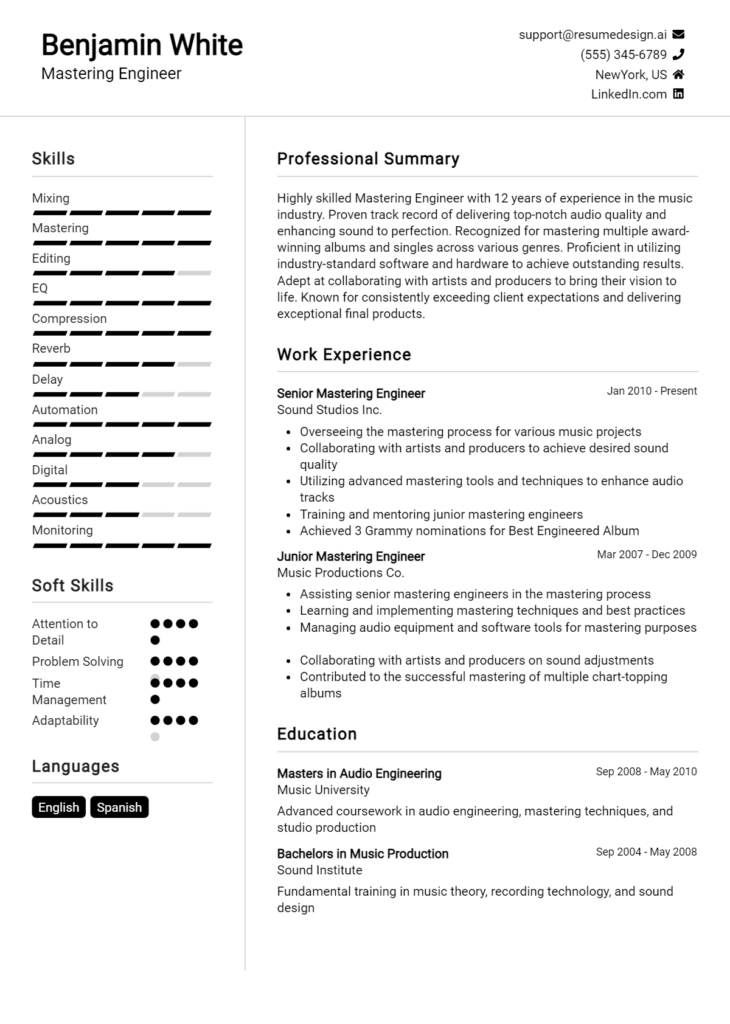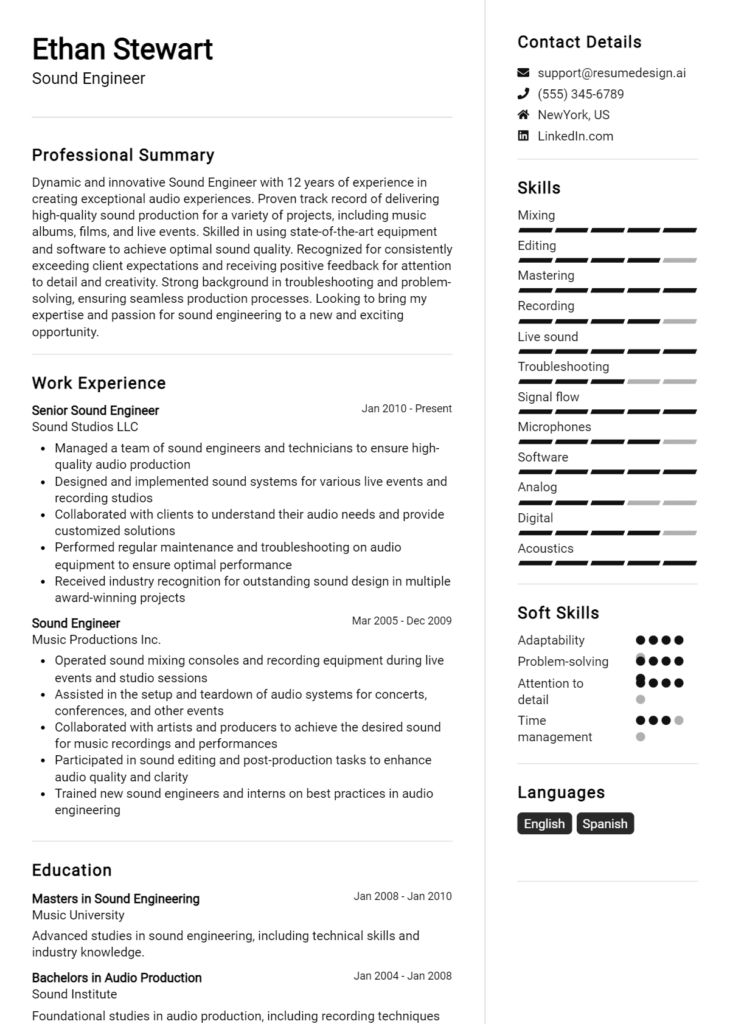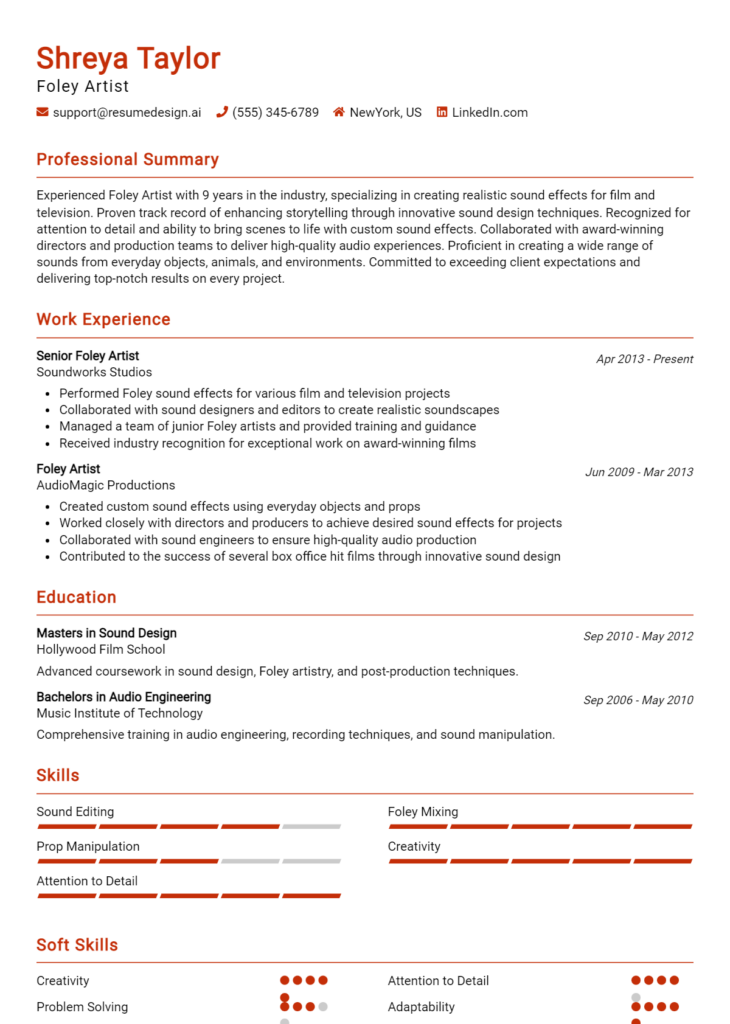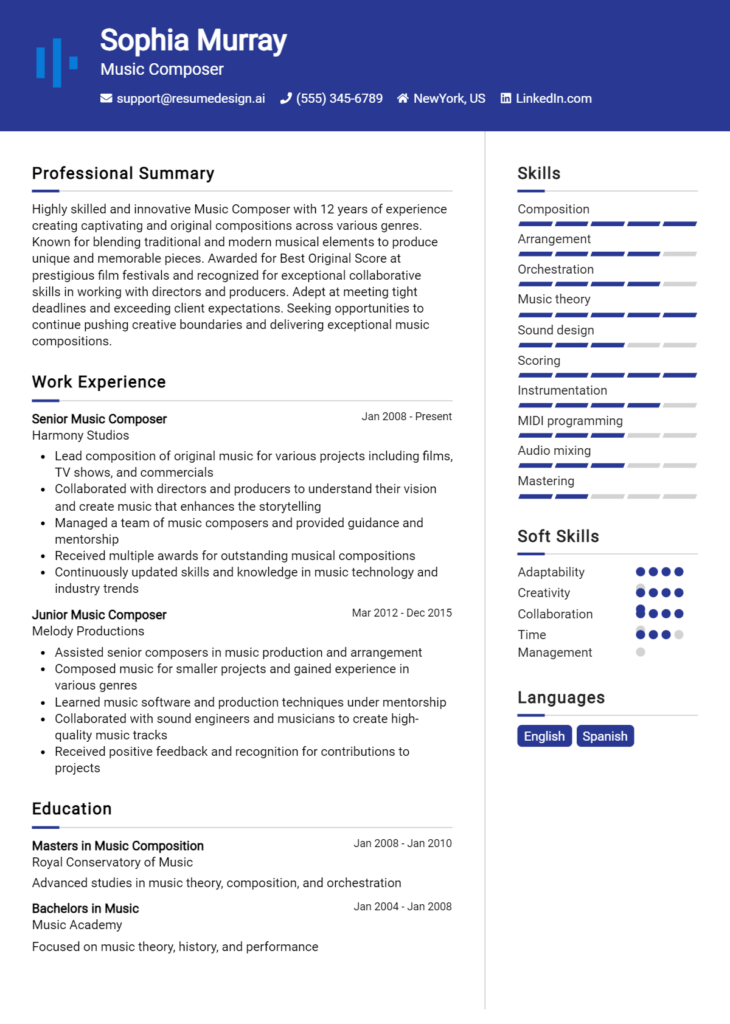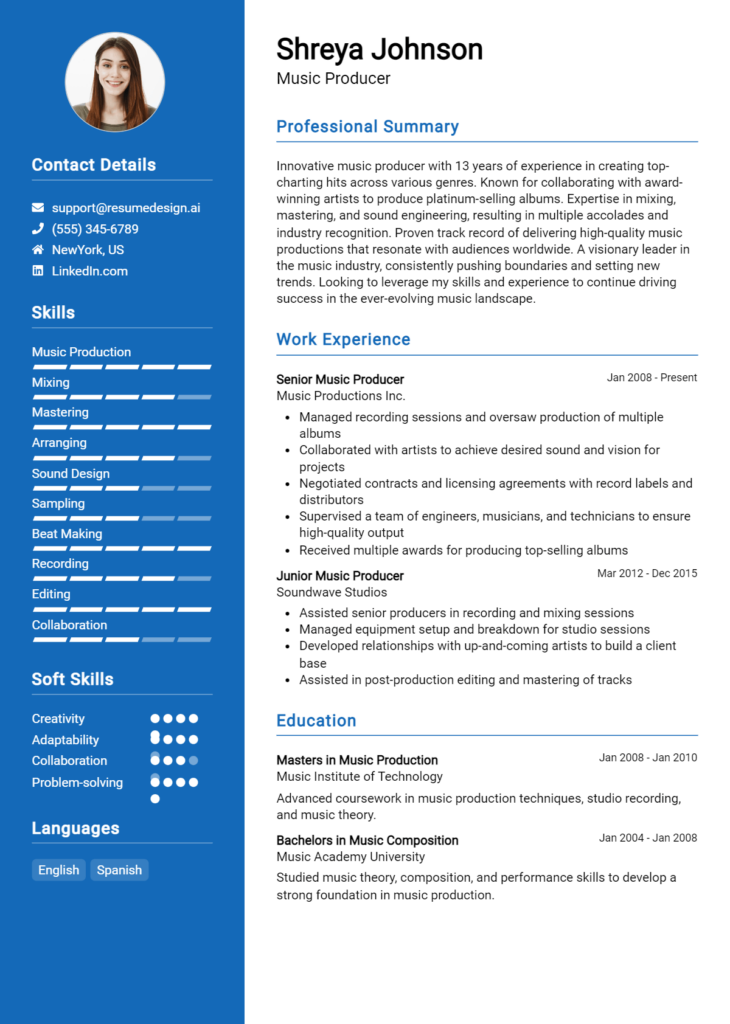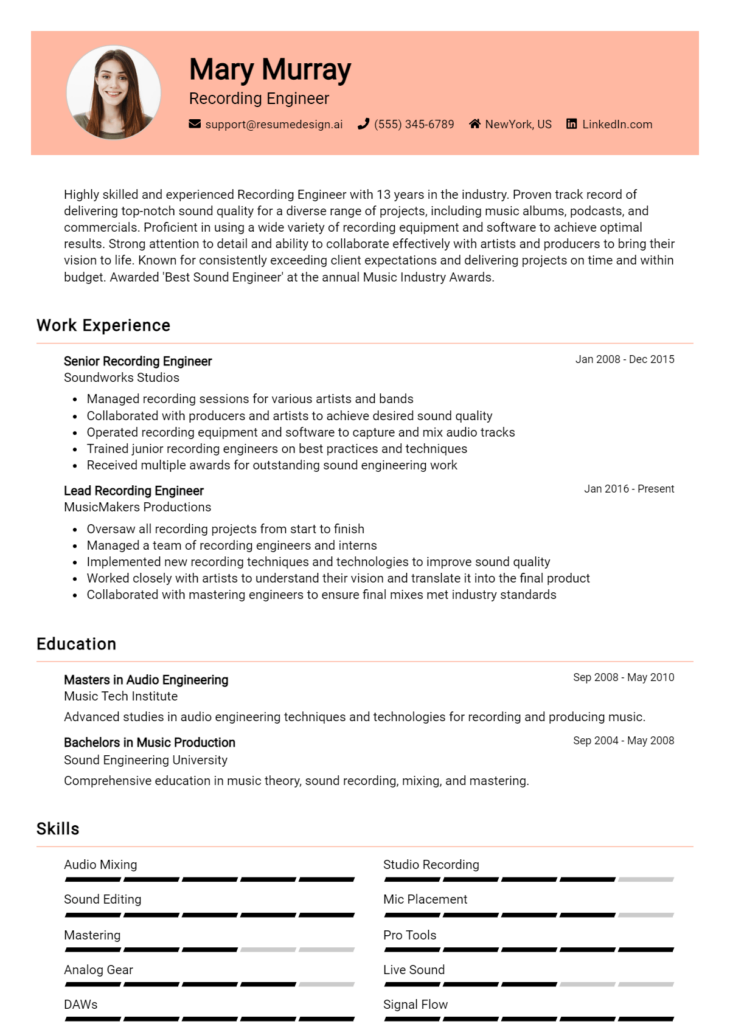Mixing Engineer Core Responsibilities
A Mixing Engineer plays a crucial role in the music production process by blending individual audio tracks into a cohesive final product. This professional must possess strong technical skills in audio software and hardware, alongside operational expertise in sound design and audio processing. Problem-solving abilities are essential for addressing mixing challenges and collaborating effectively with artists and producers. By showcasing these competencies on a well-structured resume, a Mixing Engineer can significantly contribute to the organization’s overall goals, ensuring high-quality sound delivery.
Common Responsibilities Listed on Mixing Engineer Resume
- Balancing audio levels and frequencies for optimal sound clarity.
- Applying effects such as reverb, delay, and compression to enhance tracks.
- Collaborating with producers and artists to achieve desired sound outcomes.
- Editing and assembling recorded audio into a seamless final mix.
- Conducting critical listening sessions to identify mixing issues.
- Utilizing digital audio workstations (DAWs) for mixing and mastering.
- Maintaining and troubleshooting audio equipment and software.
- Preparing final mixes for distribution across various platforms.
- Staying updated on industry trends and new audio technologies.
- Documenting mixing techniques and settings for future reference.
- Training junior engineers and interns in mixing practices.
High-Level Resume Tips for Mixing Engineer Professionals
In the competitive world of audio engineering, a well-crafted resume is crucial for Mixing Engineers looking to make a strong impression on potential employers. As the first point of contact between a candidate and a hiring manager, the resume must effectively showcase both technical skills and relevant achievements in the field. It serves as a personal marketing tool that reflects your unique expertise in creating a polished sound for various projects, from music albums to film soundtracks. This guide will provide practical and actionable resume tips specifically tailored for Mixing Engineer professionals to help you stand out in a crowded job market.
Top Resume Tips for Mixing Engineer Professionals
- Tailor your resume for each job application by aligning your skills and experience with the specific requirements listed in the job description.
- Highlight relevant experience by detailing your work on specific projects, including the type of music or media you have mixed, and the tools you used.
- Quantify your achievements where possible, such as the number of projects completed, client satisfaction ratings, or improvements in sound quality.
- Showcase industry-specific skills such as proficiency in various digital audio workstations (DAWs), knowledge of mixing techniques, and familiarity with sound design.
- Include a portfolio link to your best works, demonstrating your mixing capabilities and creative style to potential employers.
- Utilize keywords from the job description throughout your resume to pass through applicant tracking systems (ATS) and catch the attention of hiring managers.
- Highlight any collaborations with artists, producers, or other professionals in the industry that demonstrate your teamwork and communication skills.
- Incorporate certifications or relevant training that may enhance your qualifications, such as courses in audio engineering or mixing techniques.
- Keep the layout clean and professional, ensuring that your resume is easy to read and visually appealing, allowing your skills to shine.
By implementing these tips, Mixing Engineers can significantly increase their chances of landing a job in the field. A well-structured and tailored resume not only highlights your unique skill set and achievements but also demonstrates your professionalism and attention to detail, qualities that are essential in the audio engineering industry.
Why Resume Headlines & Titles are Important for Mixing Engineer
In the competitive world of audio engineering, a Mixing Engineer's resume must stand out to capture the attention of hiring managers. Resume headlines and titles play a crucial role in this endeavor, serving as the first impression a candidate makes. A strong headline can immediately grab the attention of hiring managers and succinctly summarize key qualifications in one impactful phrase. It should be concise, relevant, and directly related to the job being applied for, allowing potential employers to quickly gauge the candidate's suitability for the role.
Best Practices for Crafting Resume Headlines for Mixing Engineer
- Keep it concise: Aim for a headline that is brief yet informative.
- Be specific: Use terminology relevant to mixing engineering to showcase expertise.
- Highlight key skills: Focus on core competencies that align with the job description.
- Incorporate relevant experience: Mention years of experience or notable projects.
- Use action words: Choose dynamic verbs that convey confidence and capability.
- Tailor for the job: Customize the headline for each application to fit the specific role.
- Showcase achievements: Include quantifiable results or notable successes where possible.
- Maintain professionalism: Ensure the tone aligns with industry standards.
Example Resume Headlines for Mixing Engineer
Strong Resume Headlines
Dynamic Mixing Engineer with 10+ Years of Experience in Professional Studio Settings
Award-Winning Mixing Engineer Specializing in Genre-Bending Productions
Expert Mixing Engineer with Proven Track Record of Chart-Topping Hits
Innovative Mixing Engineer Skilled in Advanced Audio Techniques and Software
Weak Resume Headlines
Mixing Engineer Looking for Work
Experienced Audio Professional
The strong headlines are effective because they clearly articulate the candidate's expertise, experience, and achievements, making an immediate impact on hiring managers. They are specific and tailored to the role, which showcases the candidate's fit for the position. In contrast, the weak headlines fail to impress due to their vagueness and lack of detail; they do not convey a sense of competence or individuality, which is crucial in a competitive field like mixing engineering.
Writing an Exceptional Mixing Engineer Resume Summary
A resume summary is a critical component for a Mixing Engineer, serving as the first impression a hiring manager receives. It quickly captures attention by highlighting key skills, experience, and accomplishments relevant to the role. A strong summary is concise and impactful, tailored specifically to the job being applied for, ensuring that it aligns with the employer's expectations and needs. By showcasing expertise in sound design, mixing techniques, and collaboration with artists, a well-crafted summary can set a candidate apart in a competitive field.
Best Practices for Writing a Mixing Engineer Resume Summary
- Quantify Achievements: Use numbers and data to illustrate your impact, such as the number of tracks mixed or the increase in sound quality.
- Focus on Skills: Highlight specific technical skills related to mixing, such as proficiency in DAWs, audio plugins, and sound engineering techniques.
- Tailor the Summary: Customize your summary for each job application by incorporating keywords and phrases from the job description.
- Be Concise: Aim for 2-4 sentences that effectively summarize your professional background without unnecessary fluff.
- Showcase Collaboration: Mention experience working with artists, producers, or bands to illustrate your ability to communicate and collaborate effectively.
- Emphasize Creativity: Highlight your artistic approach to mixing and any innovative techniques you've employed.
- Include Relevant Certifications: If applicable, mention any certifications or training that enhance your credibility as a mixing engineer.
- Demonstrate Passion: Convey your enthusiasm for music and mixing, showcasing your commitment to the craft.
Example Mixing Engineer Resume Summaries
Strong Resume Summaries
Dynamic Mixing Engineer with over 7 years of experience in high-pressure studio environments, successfully mixing more than 300 tracks for various genres, resulting in a 20% increase in client satisfaction ratings.
Detail-oriented Mixing Engineer skilled in Pro Tools and Logic Pro, with a proven track record of enhancing audio quality for commercial releases, achieving a 15% reduction in post-production time.
Versatile Mixing Engineer with extensive experience collaborating with Grammy-winning artists, contributing to 5 chart-topping albums, and recognized for innovative mixing techniques that elevate sound dynamics.
Weak Resume Summaries
Experienced Mixing Engineer looking for new opportunities in the music industry.
Passionate about sound and music, with a background in mixing tracks.
The examples above illustrate the qualities of strong and weak resume summaries effectively. Strong summaries provide quantifiable results, specific skills, and relevance to the role, making them impactful and memorable for hiring managers. In contrast, weak summaries are vague, lack measurable outcomes, and fail to demonstrate a clear connection to the job, rendering them less effective in capturing attention.
Work Experience Section for Mixing Engineer Resume
The work experience section of a Mixing Engineer resume is crucial as it effectively highlights the candidate's technical skills, collaborative abilities, and track record of delivering high-quality audio products. This section serves as a narrative of the engineer's journey, illustrating how their hands-on experience has equipped them with the expertise to manage projects and lead teams in high-pressure environments. By quantifying achievements and aligning past experiences with industry standards, candidates can present themselves as valuable assets to potential employers, demonstrating not only their proficiency in mixing but also their commitment to excellence in audio production.
Best Practices for Mixing Engineer Work Experience
- Highlight specific software and hardware tools you are proficient in, such as Pro Tools, Logic Pro, or analog mixing consoles.
- Quantify your achievements by including metrics, such as the number of projects completed, percentage improvements in sound quality, or audience reach.
- Describe your role in collaborative projects, emphasizing teamwork and communication skills with producers, artists, and other engineers.
- Detail any leadership positions held, showcasing your ability to guide and mentor junior engineers or interns.
- Include diverse genres or project types to demonstrate versatility and adaptability in various audio environments.
- Use action verbs to convey accomplishments energetically and assertively, such as "engineered," "produced," or "optimized."
- Align your experience with industry standards, using terminology that resonates with hiring managers and reflects current trends.
- Keep the descriptions concise yet impactful, focusing on the most relevant experiences for the position you are applying for.
Example Work Experiences for Mixing Engineer
Strong Experiences
- Engineered and mixed over 50 tracks for independent artists, resulting in a 30% increase in streaming plays over six months.
- Led a team of three junior engineers on a high-profile album project that received a Grammy nomination and achieved over 500,000 sales.
- Implemented a new mixing technique that improved the overall sound quality of recordings, leading to a 25% reduction in client revisions.
- Collaborated with producers and artists on live sessions, enhancing the final product through real-time adjustments, resulting in a sold-out show.
Weak Experiences
- Worked on various projects involving mixing.
- Helped with sound engineering tasks for some artists.
- Participated in a team of engineers for a few recordings.
- Contributed to music production in an unspecified capacity.
The examples listed above are considered strong because they are specific, quantifiable, and showcase leadership and collaboration in meaningful ways. Each bullet point provides clear outcomes and demonstrates the candidate's technical expertise and ability to work within a team to achieve high standards. In contrast, the weak experiences lack detail and measurable results, making them less impactful and failing to convey the candidate's true capabilities as a Mixing Engineer.
Education and Certifications Section for Mixing Engineer Resume
The education and certifications section in a Mixing Engineer resume is crucial for showcasing the candidate's academic foundation and commitment to professional development. This section not only highlights degrees and relevant coursework but also emphasizes industry-recognized certifications and specialized training that demonstrate the engineer's expertise and proficiency in mixing techniques. By including this information, candidates can significantly enhance their credibility and show potential employers their dedication to continuous learning and staying updated with industry standards.
Best Practices for Mixing Engineer Education and Certifications
- Prioritize relevant degrees in audio engineering, music production, or related fields.
- Include industry-recognized certifications from reputable organizations, such as Avid or Dolby.
- Detail specific coursework that relates directly to mixing and sound design.
- Highlight any specialized training, workshops, or seminars attended that enhance mixing skills.
- List certifications in popular software and tools used in mixing, like Pro Tools or Ableton Live.
- Keep the section concise but informative, focusing on quality over quantity.
- Update the section regularly to reflect new achievements and credentials.
- Consider including online courses or certifications from platforms like Coursera or LinkedIn Learning if relevant.
Example Education and Certifications for Mixing Engineer
Strong Examples
- Bachelor of Science in Audio Engineering, Berklee College of Music, 2021
- Pro Tools Certified User, Avid, 2022
- Mastering and Mixing Techniques Workshop, Sound on Sound Academy, 2023
- Certificate in Music Production, SAE Institute, 2020
Weak Examples
- Bachelor of Arts in English Literature, University of XYZ, 2019
- Certification in Graphic Design, Online Course, 2020
- High School Diploma, Anytown High School, 2018
- Basic Computer Skills Certification, Local Community Center, 2019
The examples listed above are considered strong because they directly relate to the skills and knowledge required for a Mixing Engineer position, showcasing relevant education and certifications in audio engineering and music production. In contrast, the weak examples lack relevance to the field of mixing engineering, highlighting qualifications that do not enhance the candidate's fit for the role, such as unrelated degrees or certifications that do not pertain to audio or music technology.
Top Skills & Keywords for Mixing Engineer Resume
A well-crafted resume for a Mixing Engineer not only showcases technical proficiency but also emphasizes the importance of both hard and soft skills in the audio production industry. In a competitive job market, highlighting these skills effectively can set candidates apart from their peers. Mixing Engineers must possess a unique blend of creativity, technical knowledge, and interpersonal abilities to collaborate with artists, producers, and other professionals. By clearly listing relevant skills in a resume, candidates can demonstrate their suitability for the role and their ability to contribute to successful audio projects.
Top Hard & Soft Skills for Mixing Engineer
Soft Skills
- Communication
- Collaboration
- Problem-solving
- Attention to detail
- Creativity
- Time management
- Adaptability
- Critical thinking
- Patience
- Emotional intelligence
- Conflict resolution
- Active listening
- Organization
- Flexibility
- Interpersonal skills
Hard Skills
- Proficiency in digital audio workstations (DAWs)
- Knowledge of audio mixing techniques
- Familiarity with audio plugins and effects
- Mastering techniques
- Understanding of acoustics
- Signal flow and routing
- Experience with MIDI programming
- Ability to operate recording equipment
- Knowledge of music theory
- Proficiency in audio editing software
- Sound design
- Mixing for various genres
- Use of equalization and compression
- Familiarity with industry standards and formats
- Experience in live sound mixing
- Understanding of music production concepts
For more information on essential skills, check out this skills guide. Additionally, don't forget to highlight your relevant work experience to further strengthen your resume as a Mixing Engineer.
Common Mistakes to Avoid in a Mixing Engineer Resume
When crafting a resume as a Mixing Engineer, it’s essential to present your skills and experiences in the best possible light. However, many candidates make common mistakes that can undermine their qualifications, leading to missed opportunities. Understanding these pitfalls can help you create a more effective resume that stands out to potential employers in the competitive audio engineering field.
Neglecting to Highlight Technical Skills: Failing to specify relevant software and hardware expertise (e.g., Pro Tools, Logic Pro, or analog consoles) can make your resume less impactful. Employers want to know what tools you are proficient with.
Using Generic Job Descriptions: Providing vague or overly generic descriptions of past roles can diminish the uniqueness of your experience. Tailor each description to reflect specific responsibilities and achievements relevant to mixing engineering.
Ignoring the Importance of Collaboration: Mixing often requires working closely with producers, artists, and other engineers. Not mentioning collaborative projects may give the impression that you prefer to work in isolation, which can be a red flag for employers.
Not Including Metrics or Results: Resumes that lack quantifiable achievements can seem less impressive. Always try to include metrics, such as the number of projects completed, client satisfaction ratings, or any awards received.
Overemphasizing Education Over Experience: While formal education is important, mixing engineers are often judged more on their practical experience. Make sure your projects and hands-on experience take precedence over academic credentials.
Using an Unprofessional Format: A cluttered or overly flashy resume can distract from your qualifications. Keep your layout clean and professional, using clear headings and bullet points for easy readability.
Failing to Tailor the Resume for Each Job Application: Sending the same resume to multiple positions can lead to missed opportunities. Customize your resume for each application, emphasizing the skills and experiences that are most relevant to the specific job description.
Neglecting to Include a Portfolio Link: In a creative field like mixing, a portfolio is crucial. Not including a link to samples of your work can hinder your chances of being considered, as employers often want to hear your mixing style and capabilities firsthand.
Conclusion
As a Mixing Engineer, your role is crucial in shaping the final sound of a music track, ensuring that all elements blend harmoniously. The key skills you need include a strong understanding of audio equipment, proficiency in digital audio workstations (DAWs), and an ear for detail to balance levels, EQ, and effects. It's also essential to stay updated with industry trends and technologies to maintain a competitive edge.
In conclusion, to stand out in the competitive field of mixing engineering, it is vital to present a polished and professional resume that highlights your unique skills and experiences. Take the time to review and enhance your Mixing Engineer Resume to reflect your best work and achievements. Utilize available resources such as resume templates, a resume builder, resume examples, and cover letter templates to create a compelling application that showcases your talents. Don’t wait—take action today and elevate your career in mixing engineering!

